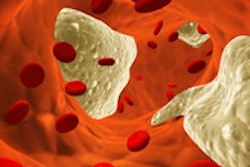Researchers at Johns Hopkins University have developed an MRI technique that can predict with 95% accuracy how stroke victims will react to intravenous, clot-busting drugs.
Measuring damage to the blood-brain barrier could help predict which stroke patients would benefit from intravenous tissue plasminogen activator (tPA) treatment and which would suffer dangerous and potentially lethal bleeding from tPA use, the researchers found (Stroke, May 15, 2014).
Intravenous tPA is given to patients after a stroke to try to dissolve the blood clot before additional damage occurs. However, in some patients there is already too much damage to the protective blood-brain barrier and treatment causes bleeding in the brain. Currently, tPA use is limited to patients who are within 4.5 hours of a stroke onset.
If doctors had a safe, reliable tool to determine which patients could still be safely treated outside of that window, more patients could be helped, according to lead author Dr. Richard Leigh, an assistant professor of neurology and radiology, and colleagues.
The MRI technique involves a computer program that allows physicians to see how much gadolinium contrast has leaked into brain tissue from surrounding blood vessels. By quantifying this damage in 75 stroke patients, the researchers identified a threshold for determining how much leakage was dangerous.
Then, Leigh and colleagues applied this threshold to those 75 patients to determine how well it would predict who had suffered a brain hemorrhage and who had not. The new test correctly predicted the outcome with 95% accuracy.
Typically, physicians perform a CT scan of a stroke patient to see if he or she has visible bleeding before administering tPA. The new computer program, coupled with an MRI scan, detects subtle changes to the blood-brain barrier that are otherwise impossible to see.
If the findings are confirmed, Leigh speculated that MRI could become the modality of choice in every stroke patient before tPA is administered.



















